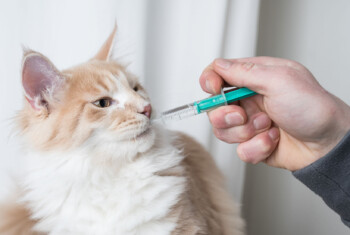Standardized veterinary CPR guidelines mean better training and can help improve patient survival.
RECOVER is an acronym that stands for the REassessment Campaign On VEterinary CPR. The initiative was spearheaded by two Diplomates of the American College of Veterinary Emergency and Critical Care, Dr. Dan Fletcher and Dr. Manuel Boller. More information and most of the information noted below is from the recoverinitiative.org website.
The goals of the RECOVER initiative were to review the current literature on veterinary CPR, derive a set of clinical guidelines for veterinary CPR based on the available literature, get feedback from the veterinary community to develop consensus guidelines for veterinary CPR, and widely disseminate this information to the veterinary and non-veterinary community. The American Heart Association guidelines for CPR in people are re-evaluated and updated every five years; this was the model used to develop and establish guidelines for veterinary CPR.
Volunteer work from over 100 veterinary specialists helped to evaluate and assess all available research in CPR and the first set of guidelines for veterinary CPR were published in the Journal of Veterinary Emergency and Critical Care in 2012. This information is available through open access at the following web address: https://onlinelibrary.wiley.com/toc/14764431/22/s1.
Using the information that was published in these guidelines, a RECOVER-based certification system for veterinary professionals was developed. This is divided into Basic Life Support (BLS) and Advanced Life Support (ALS) sections. Basic life support involves the use of one or two rescuers to provide breathing and chest compressions. ALS involves the recognition and specific treatment of specific arresting rhythms.
Veterinary professionals can achieve the status of a Certified RECOVER BLS Rescuer by taking an online prerequisite course followed by a hands-on in-person workshop to achieve certification as a RECOVER ALS Rescuer, both of which qualify for Continuing Education. This is the only CPR certification recognized by the Veterinary Emergency and Critical Care Society. A course for first responders, pet owners and handlers is in development and a course to be certified as a Certified RECOVER Instructor is also available for advanced practitioners.
The RECOVER initiative is also helping to meet other goals by encouraging both laboratory and clinical research into CPR by updating the guidelines and collecting data on patients who have undergone CPR to determine best practices. Another large group of veterinary specialists has again volunteered their time to help update these guidelines over the last few years under the direction of the RECOVER initiative team. These updated guidelines will be published soon.
Many of our BluePearl hospitals have staff who have completed both the online and in-person certifications. An example is our BluePearl Milwaukee Market hospital, where we have four Diplomates of the American College of Veterinary Emergency and Critical Care who are all RECOVER-Certified Instructors. The team has worked hard to certify a large number of our staff members as RECOVER-Certified Rescuers by holding the required in-person workshops. We actively submit all CPR data to a national database, which is available for researchers.
BluePearl has also recently completed one of our medical initiatives across all our hospitals to standardize and update all Crash Carts to be current with the RECOVER guidelines and ensure that we are providing the best possible care for our patients. A recent example of a change to veterinary CPR relates to available drugs: there has been a recent change of the available concentration of atropine from a 0.54 mg/mL to a 0.4 mg/mL concentration, necessitating an increase in the delivered volume during CPR.
Although survival numbers of veterinary CPR remain low, it is only through research, standardization and application of guidelines and re-assessment that we can improve survival from some of the direst conditions. For more information, please visit the RECOVER website: recoverinitiative.org.


